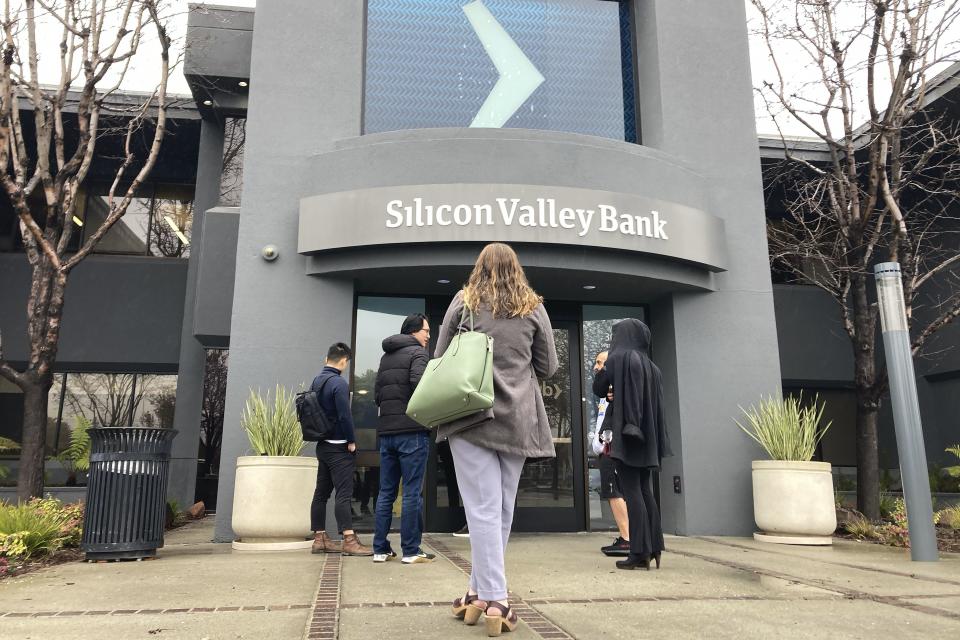The seismic impact of Silicon Valley Bank’s failure is rocking Silicon Slopes companies in Utah

The Federal Deposit Insurance Corp. seized assets of California-based Silicon Valley Bank on Friday, reacting to a customer run on the bank that left its balance books teetering. It is the second biggest bank failure in U.S. history behind the collapse of Washington Mutual amid the fallout from the housing market crisis over a decade ago.
The tech-focused bank, headquartered in Santa Clara, California, has 17 branches in California and Massachusetts and numerous offices around the country including one in Cottonwood Heights.
The FDIC shuttered the bank in the middle of the business day on Friday and said in a news release it had moved all of the bank’s insured deposits into the newly created Deposit Insurance National Bank of Santa Clara to protect those assets. But account holders, including its many clients in Utah, are cut off from accessing their insured funds until next week.
In a news release, the FDIC indicated that “all insured depositors will have full access to their insured deposits no later than Monday morning, March 13, 2023.” The FDIC said it will pay uninsured depositors an advance dividend within the next week and those depositors will also get a receivership certificate for the remaining amount of their uninsured funds. According to the release, as the FDIC sells the assets of Silicon Valley Bank, future dividend payments may be made to uninsured depositors.
The FDIC reports that as of Dec. 31, 2022, Silicon Valley Bank had approximately $209 billion in total assets and about $175.4 billion in total deposits. At the time of closing, the amount of deposits in excess of the insurance limits was undetermined. The amount of uninsured deposits will be determined, the FDIC said, once it obtains additional information from the bank and customers.
Silicon Valley Bank still appeared stable this year, but on Thursday it announced plans to raise up to $1.75 billion in order to strengthen its capital position, according to The Associated Press. That sent investors scurrying and shares plunged 60%. They rocketed lower again Friday before the open of the Nasdaq where it is traded.

As its name implies, Silicon Valley Bank was a major financial conduit between the technology sector, its founders and startups, as well as its workers, per AP. Hundreds of companies held their operating capital with the bank, and it was seen as good business sense to develop a relationship with Silicon Valley Bank if a founder wanted to find new investors or go public.
Companies impacted by the closure include Utah venture capital firm Kickstart, which was told on Friday it would be able to access funds held by the bank on Monday, but offered little additional information.
Kickstart founder and general partner Gavin Christensen told the Deseret News that his firm has had a long-running and positive relationship with Silicon Valley Bank and the closure came as a surprise.
“We’re really disappointed that it got to this point,” Christensen said. “We consider SVB a great brand in our industry and they’ve done so many great things for the startup community. They clearly made some mistakes ... but it wasn’t obvious that they could fail. We’re hoping this gets resolved in a way that doesn’t damage the startup ecosystem.”
Clint Betts, executive director of tech sector advocacy and education group Silicon Slopes, said his office was receiving a flood of calls Friday from local companies seeking more information and consult in the wake of the Silicon Valley Bank failure.
“We’re still trying to understand the overall impact this has on Utah’s startup and tech community,” Betts said. “We’re in contact with Zions Bank and other national banks to help our community mitigate whatever downfall might come from this collapse.”
Utah Bankers Association President Howard Headlee noted Silicon Valley Bank is a unique financial institution due to its hyper focus on the tech industry.
“This story is about a financial institution that was highly concentrated in one sector of very similar and sophisticated customers who had a lot of money deposited in the bank above the FDIC insurance limit,” Headlee said. “Unfortunately, those are circumstances that leave very little margin of error.”
While the FDIC insures deposits up to $250,000, Silicon Valley Bank reported at the end of 2022 that over $151 billion of its $173 billion in deposits exceeded the cutoff and were, therefore, uninsured.
The bank had deep ties to Silicon Valley industries and tech-focused regions around the country, including across Utah’s vibrant tech ecosystem. Silicon Valley based Y Combinator, an incubator startup that has launched companies such as Airbnb, DoorDash and Dropbox, has referred hundreds of entrepreneurs to the bank, according to AP.
“This is an extinction-level event for startups,” Y Combinator CEO Garry Tan told The Associated Press. “I literally have been hearing from hundreds of our founders asking for help on how they can get through this. They are asking, ‘Do I have to furlough my workers?’”
Rachelle Morris, managing director at Utah venture firm RevRoad Capital, said she and her partners have also been hearing from their portfolio companies, many of whom have accounts and assets held by Silicon Valley Bank.
“We have been in touch with those inside of our portfolio who are impacted by this and are offering whatever help we can,” Morris said. “This is an existential stress test being placed upon half of all venture capital-backed startups in the country. And they’re experiencing it simultaneously.”
The Utah Department of Financial Institutions issued a statement Friday afternoon noting Silicon Valley Bank does not have any branches in Utah and underscoring the fiscal well-being of Utah’s in-state banking system.
“Utah’s banks remain healthy and are well prepared to serve the banking needs of Utah citizens and businesses,” the statement reads. “We remind all Utahns that your deposits in banks and credit unions are fully insured up to federal limits.”
Zions Bank President/CEO Scott Anderson also shared a statement Friday evening.
“While the stock market has been anxious about banks the past few days — both because of the Federal Reserve’s suggestion that interest rates would perhaps trend higher and remain at those levels for a longer period, and the liquidity problems at Silicon Valley Bank (‘SVB’) — the fundamental strengths of the industry remain intact,” Anderson said. “In its semiannual Monetary Policy Report to Congress last week, the Federal Reserve noted that the banking industry ‘remains strong overall.’
“We recognize the significant role technology companies play in Utah’s vibrant economy and have been strong supporters of the Silicon Slopes organization and the state’s tech community for many years.”
Also Friday evening, Silicon Slopes announced plans to hold a community town hall on Monday to discuss the Silicon Valley Bank news. The group is bringing in a slate of finance and venture capital community experts to meet with local businesses. Panel participants include Anderson from Zions Bank, Larry H. Miller Group CFO Ian McDonald, Zions Bank Executive Vice President Rob Brough, Kickstart Seed Fund managing director Gavin Christensen, Zions Bank Vice President Arthur Newell, former Vice Chair of the Federal Reserve Randy Quarles and Zions Bank Tech Banking managing director Sam Clark.
Silicon Slopes said additional panelists could also be added to Monday’s event.

